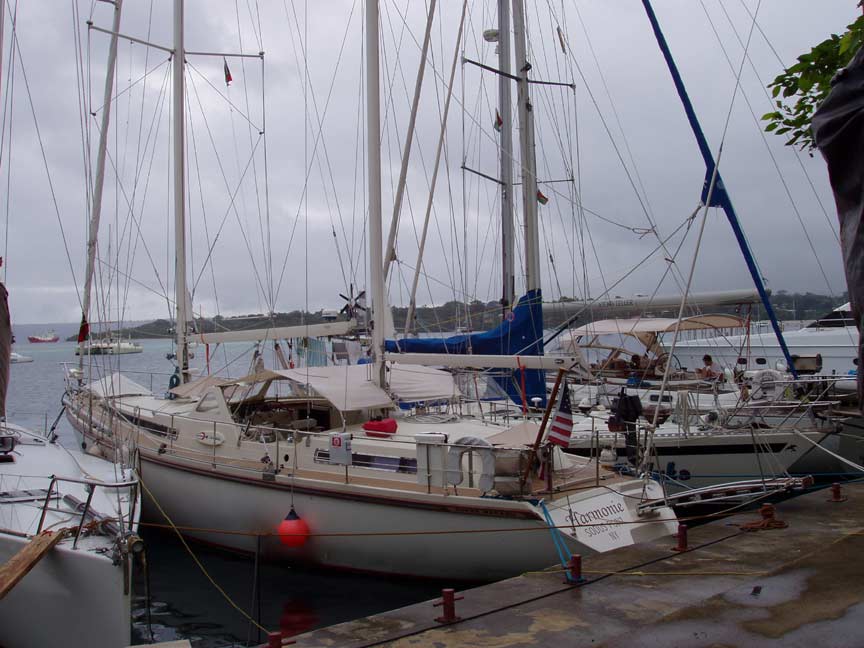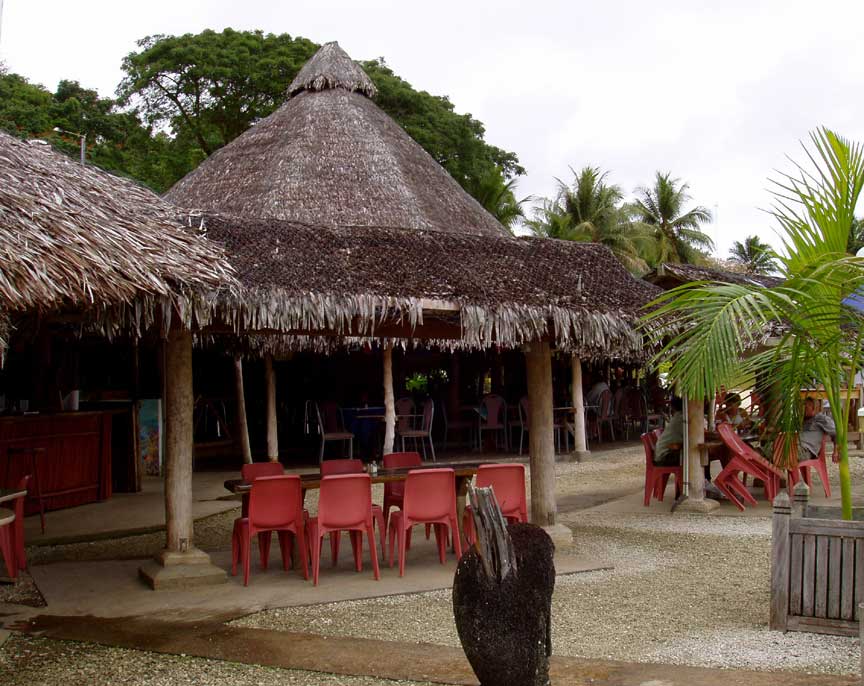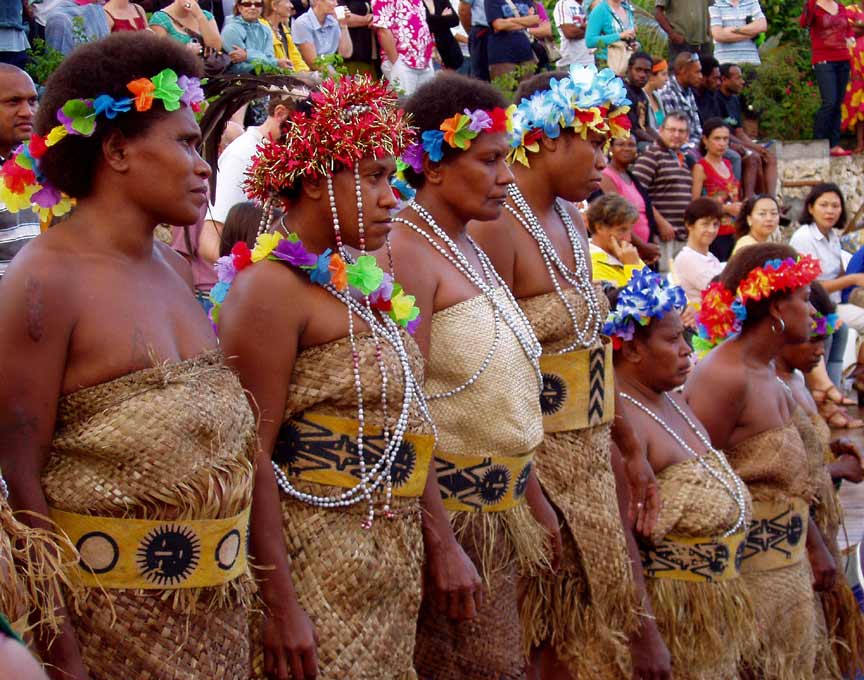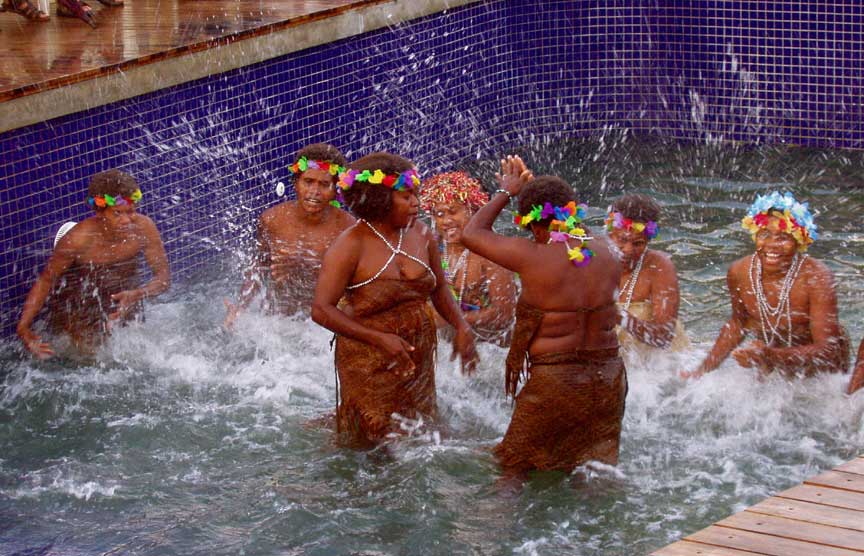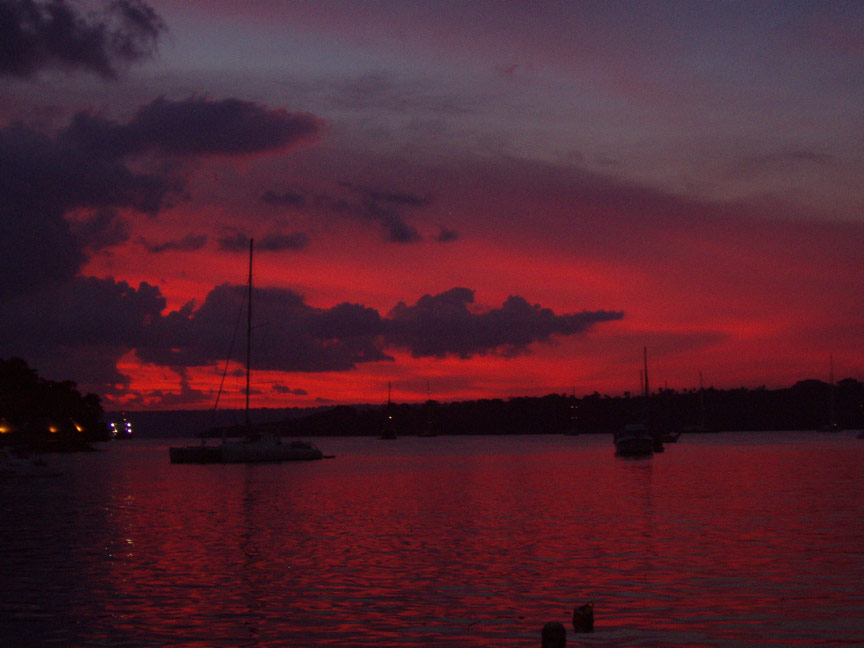Civilization, ice cream, beer and shore power in Port Vila, Efate Island, Vanuatu

Harmonie
Don and Anne Myers
Tue 2 Sep 2008 21:52
|
17:44.590S 168:18.816E
After a short, fast sail from Ai Creek on Friday
8/15, we arrived once again in Port Vila and civilization. We sailed in
company with the yelling British couple from the anchorage, but they seemed in
good spirits and we heard nothing loud emanating from their boat
along the way. Initially, we took a mooring not far from where we were the
first time we were in Port Vila the previous month, but when Monday
arrived, we squeezed onto the seawall so we could plug into shore power and
give our batteries a much needed break. This was the first time we had
been tied to land since Musket Cove in Fiji, six weeks earlier. As a
matter of fact, we counted up the number of times we had been plugged into shore
power since leaving St. Lucia in January, and it is not many - the east
coast of Panama, Tahiti, Musket Cove in Fiji, and now Port Vila. Four
times in eight months. No wonder our batteries needed a break.
It's a break for us too. For example, for
some inexplicable reason, when we are not plugged into shore power and want to
use the microwave, we have to go through a series of convoluted steps to turn it
on. First, the inverter must be turned on to convert the battery power
from 24 volts to 110, then some resistive load like the toaster or the
coffee maker must be turned on in order to mysteriously get the microwave to
come on. This is not so bad when we are resting comfortably in a calm
anchorage, but try reaching into the far cabinet for the toaster and plugging it
in without falling over when heeled twenty degrees and windward wave
bashing into twenty-five knots of wind. As you might imagine, it's
not that enjoyable. Actually, it's almost as bad as enduring the famed
toilet sandwich (as you might recall, this is when the lid smashes into your
back as you perch precariously on the toilet seat trying desperately to take
care of business as quickly as possible).
Speaking of sandwiches, picture 1 shows Harmonie
sandwiched between several other boats on the seawall in Port Vila. We are
in good company - two doors down to the right is Storyteller (Australian fellow
rally drop-out), and one door to the left is a boat being delivered to Thailand
by Jeff, the former skipper of fellow rally drop-out Whitbread. The
sailing world is mighty small.
Back to the topic of civilization. The
very first thing we did after arriving in Port Vila after three weeks 'in the
bush' was visit the internet cafe and plug the computer in to see what was going
on in the world. The second thing we did was visit the Waterfront
Restaurant (picture 2 is the restaurant and picture 3 are two of the
tree fern sculptures that surround the restaurant) and sit at the bar with a
drink. This is when we realized the Olympics were going on because women's
gymnastics was being displayed on a big flat screen TV directly in front of
us. Shortly thereafter, we had dinner - Don went for fish and chips while
I had some kind of Mexican enchilada extravaganza dish. There was not a
single fruit or vegetable to be found on either one of our plates, which
was a marvelous thing. We had intended to finish up with ice cream so that
all our cravings would be satisfied, but by the time dessert rolled around,
we just couldn't fit any more in.
We've since made up for it though. We've
been in Port Vila two and half weeks, and have chowed our way through
four liters of ice cream, at least eight bags of various varieties of junk
food, a significant number of beers and bottles of wine and more than a few
additional restaurant meals. It's probably time for some form of
moderation now. Of course we've done more than just eat and drink our way
through the days here in civilization. The boat has nearly been restored
back to its pre-rally glory with a semi-clean hull (it's almost impossible to
keep it clean at this point since the bottom paint is almost a year and a half
old), mostly waxed topsides, clean and polished insides and fully completed
maintenance list. We also had our main and head sails repaired by a local
French guy who lives on his boat in the harbor with his family. Our main
had a few small tears in it as a result of me furling it in the high
Fiji-to-Vanuatu winds and it catching on something on the mast that caused two
small tears. Our head sail, which unlike our main, mizzen and balooner,
was not replaced before we left home, was in need of some serious
attention. The sacrificial UV strip of cloth that protects the sail from
the sun when the sail is furled had completely sacrificed itself. Not
only that, but the stitching on many of the seams had also gone to a better
place. Eric, the French guy, replaced the UV strip and restitched all the
ailing seams. His conclusion was that our sails will last for another
good while now. All else is in good shape with the exception of the model
7000 autopilot. Don was able to fix it mechanically, but when the beast
jammed, it seems the computer bit the dust. This is not something that
Don, the marvelous maintenance man, can fix, so we will take the injured
autopilot to New Zealand with us and hope it can be brought back to life
before we set off for the islands again next season.
We have spent a fair amount of time with the crew
of Storyteller, John and Sue, both of whom were in the publishing business
in Australia before retiring (hence the name Storyteller). Sue
has become the literary and cultural missionary to Harmonie, continuously
spreading the good news about well-written historical books, ideas for places to
visit and restaurants to sample. John is a long time sailboat racer, so he
is probably pleased that Sue has off-loaded a good bit of weight in the
form of books, CD's, DVD's, etc. from Storyteller onto Harmonie. We don't
mind the extra weight given the entertainment value. On Sunday evening, we
had the pleasure of going to see the ten women from Gaua Island, freshly back
from their trip to Spain, perform water music in the pool of the 'European Union
Residence'. The women must have been exhausted - having just arrived back
in Vanuatu the previous day, and all of them never having traveled before.
Regardless, their performance was excellent and included a few
more features than the Lakona Bay water music performance we saw
before. This group of ladies wore costumes of traditional woven mats, sang
along with their music, and had a commentator that explained the meaning behind
each 'song'. The swimming pool wasn't as appropriate a venue as the fresh
water pool at the edge of the Lakona black sand beach on Gaua, but it
didn't really take away from the music. The costumed women are shown in
picture 4. Picture 5 shows the women in action, 'playing' a song
about children playing. Sue and John didn't get a chance to sail to
Gaua Island, so this was the first time they saw/heard the water music and they
were just as enthralled as we were. There were about 200 people in
attendance, most were visitors or ex-pats living in Vanuatu, and all were just
as captivated. The commentator mentioned that the women were initially
scheduled to perform just one time in Spain, but the response to their
performance was so overwhelming they ended up putting on six shows. We
weren't surprised.
This is now the longest we've been in one place
since the six weeks we spent in Baltimore nearly a year ago. It has been
great to be in one place and catch up on boat jobs, etc., but we are both
starting to feel like it's time to move on. We plan to sail to
New Caledonia with Storyteller, and are just waiting for the wind to turn more
easterly before we set off. Since our course will be southerly, a more
easterly wind will hopefully mean little or no bow slamming. The trip
is short, only thirty-three or so hours, but thirty-three hours can feel
like a mighty long time if the conditions are bad. Southern Princess
(the other half of the Australian Twin rally drop-out team), sailed for New
Caledonia earlier this week and they reported that the trip was not one of their
best. They had many bow slams, some water leakage into their back
cabin, and as John the captain put it in their blog, 'there was high tension on
board'. Unfortunately, they had to go when they did because some friends
are flying in to New Caledonia to meet them on the 3rd. We are happy
to have the luxury of sailing with a very loose schedule which
allows us to sit back and wait for good wind to arrive. And certainly
it's no problem to remain tied to the seawall here in Port Vila. There is
limited space, but the marina management doesn't seem concerned about when boats
plan to come or go. They've never asked how long we plan to stay, never
asked for a credit card number and just assume we will settle up at some point
before we decide to go. The atmosphere is pretty low key and there
are essentially no rules. The cost is only $14/day with all the
electricity and water we care to use thrown in. We figure it's
actually cheaper to be tied to the sea wall and plugged into shore power than it
is to pay for a mooring and have to use fuel to run the generator twice a
day. Not a bad deal at all.
Our current plan is to clear out of Vanuatu
tomorrow (Wednesday), fill up our tank with duty-free fuel and leave the Port
Vila harbor for an anchorage just around the corner. We'll stay there
Wednesday night and then start for New Caledonia at first light on Thursday with
Storyteller. The two of us should arrive in the Loyalty Islands
of New Caledonia sometime before sunset on Friday. That's the plan
anyway.
We'll be sorry to leave Vanuatu and its amazing
people after our two-month long stay, but we look forward to returning next
year.
Picture 6 is one of the many fantastic sunsets
we've seen from our vantage point on the seawall. Thought you might be
pining for a sunset since there hasn't been one on the blog in a
while.
Anne
|
